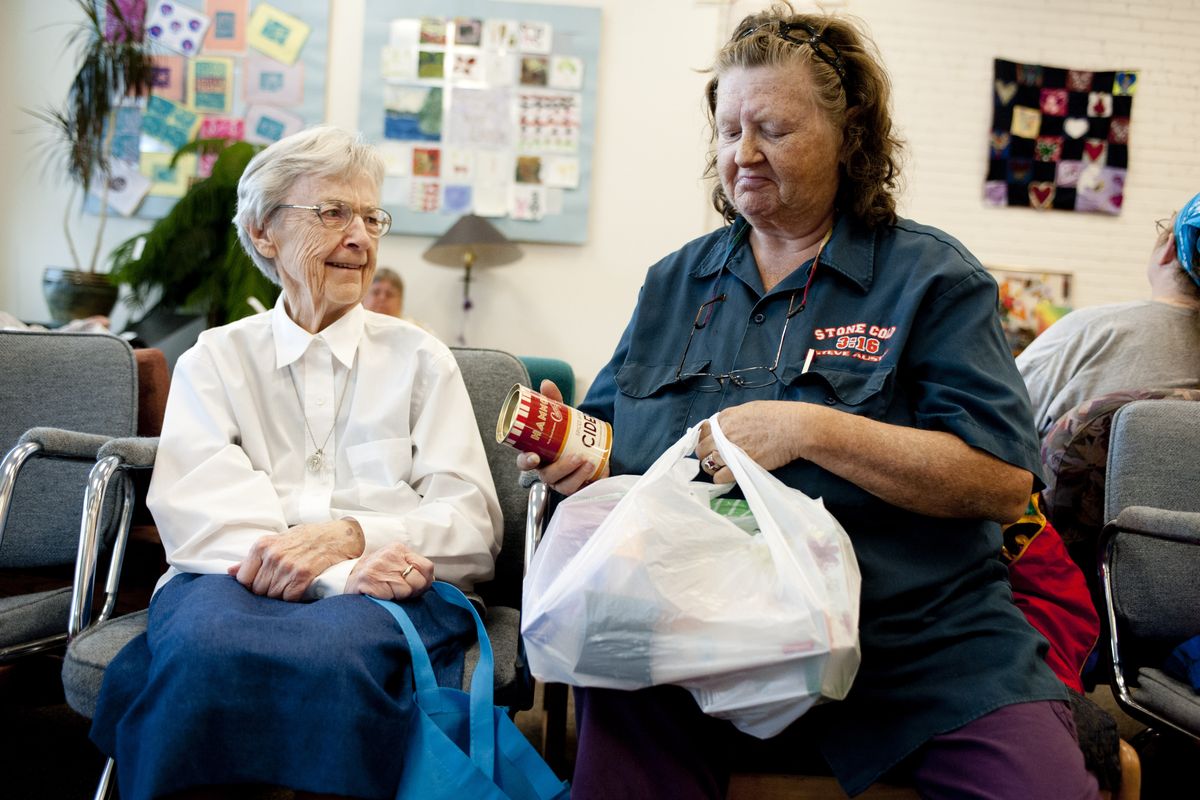Holy Names sisters look ahead to changes facing the ministry
They mark 125 years of service in Spokane

Two Holy Names sisters, Mary Ann Farley and Celine Steinberger, grew teary-eyed during a recent interview about the ways Holy Names sisters have been part of Spokane for 125 years.
These are two resilient, accomplished sisters, unafraid of much or many. They didn’t apologize for their tears.
Two days before, they’d lost a beloved sister, Virginia Maria Shelton, who died at the convent at age 102.
And this summer, they’d sent a letter to 8,000 Holy Names alumni and benefactors and to the families of sisters who live at the landmark Holy Names Convent on Fort George Wright Drive. Beginning in November, the sisters in the convent’s care center will move to Harbor Crest, a retirement community on Spokane’s South Hill, and the rest of the sisters will eventually move to Harbor Crest, too.
Spokane is still home to 60 Holy Names sisters; some live in community homes and apartments, and 40 live at the convent, including 17 in the care center. The sisters in Spokane range in age from 70 to 100.
Steinberger – the community’s director of development – knows rumors are circulating that the convent is already sold, or is on the market, or will be shuttered in six months. Not true.
“People are curious what will happen to this building and this property. That is a whole other process that hasn’t begun yet,” she said. “The ministry of the Holy Names will continue on this land – that is our hope.”
The tears, the women said, were of sorrow for their deceased friend, and sorrow that the community’s elder sisters won’t finish out their lives at the convent, their beloved home.
But the tears, the women said, were also born of gratitude for 125 years in Spokane, and for the ways the Holy Names ministry continues to evolve.
In the summer of 1888, when the first Holy Names sisters arrived in Spokane, Washington wasn’t yet a state. With education as their mission, they eventually built Holy Names Academy near Gonzaga University. They also built Fort Wright College along the Spokane River. Both institutions had vital lives for decades in Spokane, graduating thousands of students.
“We used to all be educators in classrooms. Our world was our classroom,” said Farley, the convent community director. “Now our classroom is the world.”
There are still nearly 900 Sisters of the Holy Names worldwide. The religious community was founded by Marie-Rose Durocher of Montreal in 1843 and spread from there to the United States.
Durocher’s calling was the education of young women from all walks of life, with special emphasis on art and music.
“There were educational opportunities for boys of any social state, but not for girls,” Farley said. “Part of being well-rounded was to have some sort of musical and artistic abilities. Rose wanted to offer girls who came to her schools the same advantage.”
The legacy of the Holy Names sisters is manifest in the works of several regional artists, including Sister Paula Turnbull, whose sculptures grace many public and private spaces; she is beloved by Spokane children for her garbage-eating goat at Riverfront Park.
Opera singer Thomas Hampson is one of many successful professional singers and musicians who trace the origins of their careers to music education with the Holy Names sisters.
As the Holy Names sisters moved out of the classrooms and into the world, their ministry evolved.
“We have always tried to meet unmet needs, to be women of hospitality, women of prayer and presence, not just educators,” Steinberger said.
So among the many places you’ll find Holy Names sisters now?
At the Women’s Hearth, a drop-in center for low-income women in downtown Spokane, and at Our Place Community Ministries in the West Central neighborhood. They also help out with the Fig Tree, a faith-based newspaper, and “a lot of us are on boards in Spokane,” Steinberger said.
The sisters worldwide have taken on the cause of human trafficking and other global issues; the Spokane sisters recently held their annual fundraising event for schools in Lesotho, Africa.
As the average age of the Holy Names sisters increased, collaboration became the key to the community’s survival. For instance, there are dozens of Holy Names Associates in Spokane, women and men who live out the sisters’ ministry in their daily lives.
Recently, in conjunction with other religious communities in Spokane, the sisters participated in a Diocese of Spokane retreat for young women interested in religious life; 35 women in their late teens and 20s showed up.
“My heart is full of hope for the future of religious life,” Steinberger said. “I don’t think it will look like it does today. But we are alive and well.”